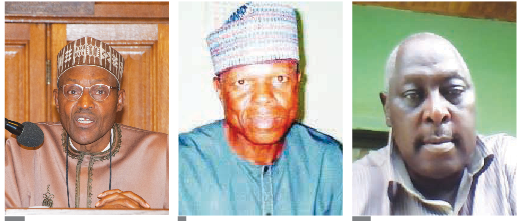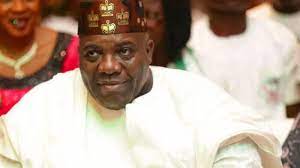Latest appointments by President Muhammadu Buhari add to growing concern in some quarters on the character of his administration in relation to national spread, Editor, Politics/Features, EMEKA ALEX DURU, writes.
Not even the most ardent supporters of President Muhammadu Buhari are amused at the unfolding pattern in his appointments to key offices since his inauguration on May 29.
Attempts had been made in the past to explain the lopsided appointments, by presidency officials and senior members of his All Progressives Congress (APC), on the need for departure from the previous arrangement that had seen offices being occupied by considerations not strictly tied to competence and ability to deliver.
Coming against the backdrop of the President’s anti-corruption posture and the clamour for comprehensive change from the so-called “Nigerian system”, analysts had closed their eyes on some of the placements that ordinarily would have attracted critical reactions, given that they were obviously tailored to a particular section of the country, in this case, the North.
Curiously, Buhari seemed to have cashed in on that unusual equanimity with which the earlier appointments had been received and had burrowed in, or so it seemed. But by Thursday, August 27, it had become apparent that the President may, perhaps, have an agenda that is completely at variance with the thinking and permutation of even his perceived close allies on the thrust of his administration.
In that direction, the President approved the appointments of Babachir David Lawal as Secretary to Government of the Federation (SGF); Abba Kyari – Chief of Staff to the President; Col. Hameed Ibrahim Ali (rtd.) – Comptroller-General, Nigeria Customs Service; Kure Martin Abeshi – Comptroller-General, Nigeria Immigration Service (NIS); Senator Ita Enang – Senior Special Adviser (SSA) to the President on National Assembly Matters (Senate); Hon. Suleiman Kawu – Senior Special Adviser (SSA) to the President on National Assembly Matters (House of Representatives).
The appointments took effect from August 27, 2015, according to a statement signed by his Senior Special Adviser (Media), Femi Adesina.
The exercise threw many, including members of his party, off-guard. For one, most of the appointees fell outside those repeatedly speculated in public domain as waiting in the wings for some positions.
Lawal, who until now, was APC National Vice Chairman (North East), had, for instance, not been featured among those touted for the SGF job. In fact, former Abia State governor, Dr. Ogbonnaya Onu, had appeared a front-runner among those speculated for the office.
This aside, some of the latest appointees are considered as members of the old brigade, thus, raising questions on how far they would fit into the advertised course of the reform agenda of the current administration. Ali, former Kaduna Military administrator, who was appointed Customs CG, falls into this league.
Apart from being transposed from his core military area to an entirely new sphere, there are fears of his new posting weakening institutional harmony in the Customs. Those who hold this fear argue that with Ali, an outsider being imposed on the Service, officers’ morale on career progression, has been badly affected.
Some observers argue that the appointments are skewed in favour of the Northern section of the country to the disadvantage of others.
Pan-Yoruba socio-political organisation, Afenifere, has, for example, kicked against the appointments, describing the exercise as worrisome.
Publicity Secretary of the group, Yinka Odumakin, had in reaction to the appointments, remarked: “In a plural society like Nigeria, there is no zone you cannot find competent people. That is why people are already getting worried over all these lopsided appointments. Even some people in the North are being embarrassed with all these appointments.
“There is no way you can have balance and an inclusive society when key appointments are coming from a section of the country. These lopsided appointments can never support the unity of the country.”
International Law expert, Professor Akin Oyebode, on his own, noted that Buhari will invite unto himself accusations of building a Northern hegemony if the perceived lopsidedness in making appointments continues.
Oyebode, who made the remark in a Lagos-based Television Continental (TVC) on Friday, Augus 28, stressed that the pattern of appointments so far made shows that the North, where the President hails from, has taken a lion’s share of positions already filled. He urged the President to make appointments in a manner that will give all sections of the country a sense of belonging.
Lagos lawyer, Henry Nwuke, however asked Nigerians to exercise patience with the President, arguing that what currently may appear as neglect of the Federal Character principle may turn out being the best for the country in terms of delivering the so-called democracy dividends.
“One of the beautiful features of democracy is the element of periodic elections. At least, this year we voted out PDP (Peoples Democratic Party) and APC came into power at the centre.
“President Buhari now has four years to show us why he has long sought out votes to lead Nigeria. We may not like all he is doing now. I, for one, am uneasy about the appointments so far made by his government, which are obviously lopsided against the Southern part of Nigeria.
“But we have given him the mandate to govern for four years, at the end of which he will be assessed. Who knows, his appointees may do so well that we will appreciate that it does not take Federal Character to perform. We may be on a journey to institutionalise merit in our public sphere as against Federal Character,” he stated in his social media, Facebook, page.
Appointees at a glance
Lawal, the new SGF, hails from Hong Local Government Area of Adamawa State. He graduated from the Ahmadu Bello University (ABU), Zaria, in 1979 with a Bachelor of Engineering Degree and worked with the Delta Steel Company (DSC), Aladja; Nigerian External Telecommunications Limited and Data Sciences Limited before establishing his own information communications technology (ICT) and telecommunications consulting firm in 1990. He is also a member of the Nigeria Computer Society, the Nigeria Society of Engineers and the Council for the Regulation of Engineering in Nigeria.
Kyari, the new Chief of Staff to the President, holds Bachelor’s and Master’s degrees from the University of Cambridge and the University of Warwick in Law and Sociology. He has worked with the New Nigeria Development Company, New Africa Holdings, African International Bank, United Bank for Africa, Unilever, and Mobil in various capacities over the years.
The new Customs CG, Col. Ali, holds Bachelor’s and Master’s degrees in Criminology. He was military administrator of Kaduna State from 1996 to 1998.
The new CG of Immigration, Abeshi, hails from Nasarawa State. He joined the Nigeria Immigration Service (NIS) in 1989 as an Assistant Comptroller. His educational qualifications include a Master’s degree in Public Administration.














